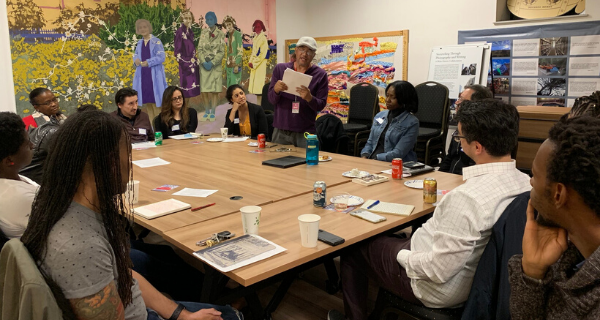
Editor's Note: This is the twelfth in a series of essays and podcasts in which readers and writers from all corners of the Lighthouse Writers Workshop community express why they believe in our mission to elevate the literary arts. Please support these important programs on Colorado Gives Day, December 10, when every gift is boosted by a $1.5 million incentive fund. Save time by scheduling your gift today; just select “Colorado Gives Day” under frequency and your donation will be processed on the 10th and boosted by the incentive fund.
It’s strange to not see yourself in the room. That was my academic workshop experience, sitting in rooms with people who hadn’t had piñatas at their birthday parties, who didn’t spend whole summers at their cousin’s houses watching old Jackie Chan Kung Fu movies and eating arracheras with slices of lime. I found that the workshop wasn’t my space. I was asked to explain myself, my fragmented, biracial culture, my interest in horror and sci-fi and not literary magical realism. I was asked to explain why I didn’t speak Spanish, why there was no Spanish in my stories. I did not look how they expected me to look. My stories about were flagged as disingenuous, hard to believe. In rooms where you’re not seen, you spend a lot of time defending your history, your identity, yourself.
As writers I think we seek out rooms where we’re wanted. It’s for this reason that fellowships like Writer in Color at Lighthouse exist. Without the Writing in Color Fellowship, I might still be locked in one of those rooms, caught in a loop of explanation, unable to tell personal stories, real ones about the modern things that were my own unique experience. Instead of writing stories where I was only my collective brown-skinned pain, and never got to celebrate, or bloom.
As a Writing in Color Fellow, I received time and community, and a room where I stopped having to explain myself. In a cabin near Estes Park, I joined two dozen other Black, Indigenous and People of Color (BIPOC) in the first writing workshop of its kind in Colorado: usually it is only those who can afford retreats, and who know they exist, who get to go. Here, we commiserated, of course, but also pushed each other, in our work and in our sentiments. On a very practical level we served as guides to the greater publishing and writing world where we are still in a lot of ways pioneers.
Without the money from this fellowship I couldn’t afford classes at Lighthouse. Finding a Latinx author also interested in horror and fantasy to mentor me would have certainly been difficult; paying them for their time would have been impossible.
Often BIPOC lack not just the financial resources but everything that comes with them—the wisdom of mentors, the opening of doors, the golden ticket recommendations—that make writing as a career a possibility. John Leguizamo said, “I see the new Latin artist as a pioneer, opening up doors for others to follow. And when they don't open, we crowbar our way in.” I was the second kid in my family to go to college, and the first to receive a Master’s degree. What I want from this Fellowship is that it continues, so I can hold the door for the person behind me. Because too many BIPOC writers spend time defending themselves and their work, or warping themselves into shapes that are explicable and caricatured versions of themselves for misunderstanding audiences, and they never get to write and thrive.
Joe Ponce is from Joliet, Illinois. He holds an MFA from Columbia University, and his work has been published in Anathema Magazine, Blunderbuss Magazine, and Apogee Journal. He has taught for the Fulbright Commission in eastern Turkey, and has also taught in in La Rioja, Spain. He is currently at work on a speculative thriller about disappearances, family secrets, obsessions, and mania in Midwestern America. He lives in Denver, CO, volunteers with Casa De Paz, an immigrant assistance organization, and tweets sparingly from @AppearingMerely.
Read the other entries in the Colorado Gives Day 2019 series:
"Fort Lyon Standard Time" by Sarah Shotland
"Marking Time in the Lighthouse Attic" by Gay Porter DeNileon
"The Poet Can Teach You Whatever You Need" by C3 School students
"Facilitating Friday 500" by Sheryl Luna
"Finding My Place" by Jennifer Wortman
"Like a Form of Release" by David Mejia
“Monumental Fun” by Susan Blosten
"Confessions of a Night Writer" by Twanna LaTrice Hill
"To Build Impossible Worlds" by Connor Rodenbeck
“A Mission of Compassion” by Michael Sindler
“It Takes a Village” by Tiffany Quay Tyson

